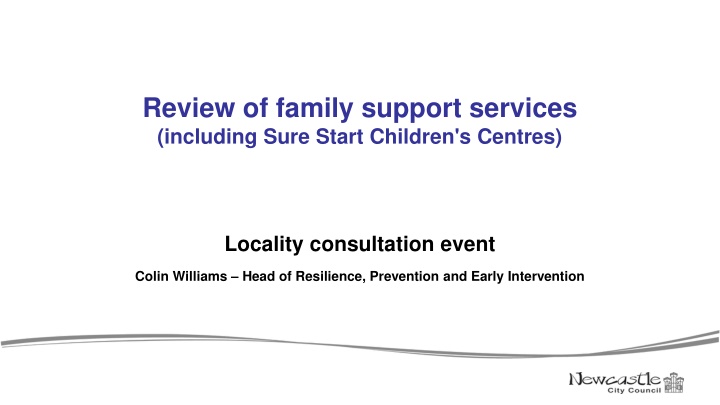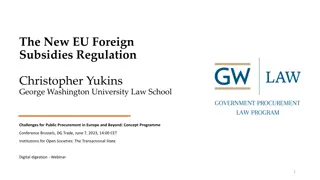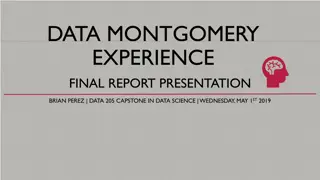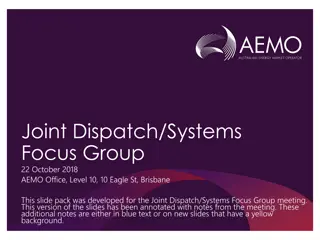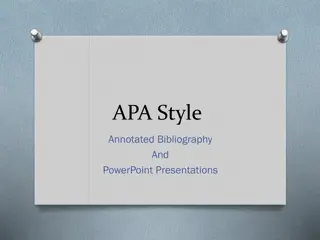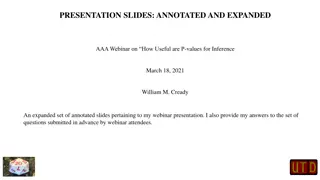Locality Consultation Event: Review of Family Support Services by Colin Williams
The event, led by Colin Williams, focused on reviewing family support services, including Sure Start Children's Centres, in response to council budget reductions. Stakeholders engaged in structured discussions to address the needs of children, young people, and families, aiming to inform future decisions by Newcastle City Council. The event emphasized collaborative feedback and sharing of models, with facilitators guiding table discussions.
Download Presentation

Please find below an Image/Link to download the presentation.
The content on the website is provided AS IS for your information and personal use only. It may not be sold, licensed, or shared on other websites without obtaining consent from the author.If you encounter any issues during the download, it is possible that the publisher has removed the file from their server.
You are allowed to download the files provided on this website for personal or commercial use, subject to the condition that they are used lawfully. All files are the property of their respective owners.
The content on the website is provided AS IS for your information and personal use only. It may not be sold, licensed, or shared on other websites without obtaining consent from the author.
E N D
Presentation Transcript
Review of family support services (including Sure Start Children's Centres) Locality consultation event Colin Williams Head of Resilience, Prevention and Early Intervention
Outline of the event Time Activity 9.45am Welcome and context setting - Colin Williams, Head of Resilience , Prevention and Early Intervention 10.00am Table discussion 10.15am What do we know about the needs of children, young people and families? Steve Foreman, Senior Performance Analyst Table discussion 11.00am Overview of the 3 Models 11.30am Table discussion 12.15pm Lunch 12.45 Table discussion 2pm Expressing a preference 2.30 Close
Context Council budget reductions 2013-16 The Family Services Review -combination of Sure Start Early Years and Childcare IIA and Family Services; Combined savings target 2014-16 : 4.67million The wider context: -The Change for Families Programme
Purpose of today Part of a series of locality consultation events Open invitation to parents, stakeholders, partners, staff, elected members, community members Day is structured to share with you: -what has informed the development of the models -the detail of each of the models Feedback from all locality events will inform a report to Newcastle City Council Cabinet in October 2014. Cabinet will make the decision on the way forward
The programme Structured some presentations from front but majority of time in guided discussion at tables Table discussions: 1. To look more closely at the data 2. To review the models: the implications, strengths and challenges of each 3. To assist individuals to think through the questions 4. To help each individual make up their own mind Facilitators at each table: their role is to support the process, not as experts in the data or the models Project team members around to provide clarification
What do we know about the needs of children, young people and families in the city?
Empment Health & Disability Income Indices of Multiple Deprivation Crime Education Skills & Training Living Env ment Barriers to Housing & Services
Introducing the Lower Level Super Output Area (LLSOA)! 32482 LLSOAs across England with 173 in Newcastle 1-10% 1-10% 11-20% 11-20% 21-30% 21-30% 31-40% 41-50% 51-60% 61-70% 71-80% 81-90% 91-100% England 1-10% 11-20% 21-30% 30-100% Newcastle
Unauthorised absence School Absence Children with Special Educational needs Teenage Parents Children living in poverty GCSE results Key Stage 2 results 16+ with no qualifications Children with English as an additional language Families in receipt of Child Tax Credit Unemployment Adult learners Health problems limiting activities NEET Breastfeeding Eligibility for free school meals Household tenure Person to bedroom ratio Long-term mental health problems Alcohol related hospital admissions Depression and anxiety Unpaid carers Domestic Violence Looked After Children Late ante-natal bookings Babies with low birth weight High BMI at time of ante- natal booking Child Protection Obesity Common Assessment Framework Speech & Language Referrals Tooth decay Substance misuse Key Stage 1 results EYFSP achievement Analysis of Need Immunisation Newcastle Families Programme eligibility Youth offending
The Newcastle Context 58,385 0-18 year olds live in Newcastle (2011 census) 36,904 children of compulsory school age attend Newcastle state- funded schools 21% of those children have one or more special educational needs 26% are from black and minority ethnic backgrounds, and the proportion has increased over time 21% speak English as an additional language 35% live in the 10% most deprived areas nationally 50% live in the 20% most deprived areas nationally 60% live in the 30% most deprived areas nationally
Narrowing the gap National Average Newcastle Average The prevalence of breastfeeding at 6 8 weeks 80% 70% 60% In 2012/13 the gap to National is 2.4 percentage points In 2009/10 the gap to National is 3.8 percentage points 50% 47.2% 47.2% 46.1% 44.7% 44.9% 2011/12 2012/13 40% 42.2% 2010/11 40.9% 2009/10 2012/13 40.1% 2010/11 2009/10 2011/12 30% 20% 10%
Health Obesity in Year 6 (2012/13) 1-30% IMD Areas 26.3% Obesity in Year 6 (2012/13) 1-10% IMD Areas 27.2% Obesity in Year 6 (2012/13) 1-20% IMD Areas 27.2% Obesity A greater proportion of children are obese in more deprived areas. Obesity in Year 6 (2012/13) 22.8% Obesity in Year 6 (2011/12) 25.2% Obesity in Year 6 (2010/11) 24.9% Reception (12/13) 12.2% The proportion of children who are obese almost doubles in the 6 years between reception and year 6. The proportion of children in year 6 who are obese has fallen over the past 2 years. National (2012/13) 18.9% An additional 4 in every 100 children are obese in Newcastle compared to the whole country.
Key Stage 2- % pupils achieving level 4+ in Reading, Writing and Maths 2012-14 70.0% 80.0% GCSE results - 5+ A*-C grades including English and Maths 2012-2014 78.0% 60.0% 76.0% 50.0% 74.0% 72.0% 40.0% 70.0% 30.0% 68.0% 66.0% 20.0% 64.0% 10.0% 62.0% 0.0% 60.0% 2011/12 2012/13 2013/14 2011/12 2012/13 2013/14 1-10% Most Deprived Areas 1-20% Most Deprived Areas 1-30% Most Deprived Areas All Newcastle Attainment England average
Child Protection Plans at end of year 2013/14 by IMD area Child Protection Plans at end of year 2013/14 by age group (per 10,000) 120 11% 100 10% 80 60 40 58% 21% 20 0 All Under 5s Primary Secondary Newcastle 1-10% 11-20% 21-30% >30% IMD Vulnerability
Key Messages: We have undertaken a comprehensive needs analysis across a broad range of indicators for children, young people and families. We have covered a handful of outcomes in this presentation but they reflect the wider findings from the needs analysis. While outcomes across the majority of indicators are improving there remain clear links between poorer outcomes and deprivation. There is evidence of improvement in outcomes in areas of higher deprivation but we need to sustain the faster rate of improvement in those areas in order to narrow the gaps.
Overview of the 3 models Family services review - Services and Budgets in scope The Wellbeing Care & Learning Early Help and Supporting Families offer The 3 models: -variations with increasing emphasis through model 1 to model 3 on a Community Family Hub offer, with resource implications on offer for targeted groups and statutory functions
Statutory Support Functions 418,680 (3% of budget in scope) Family Support Family Services Review 1,476,960 Parent Partnership Service Childcare Sufficiency Early Years and Childcare Workforce Development Support for the provision of leisure facilities for children and young people (13% of budget in scope) Services and Budgets in Scope Commissioned Family Support Senior Parenting Practitioners including evidenced based parenting programmes Services fully/partially funded through Newcastle Families Programme: Targeted Support Services - 2,658,800 (23% of budget in scope) Integrated Working Mentors Strengthening Families Coordination Video Interaction Guidance Family Support Volunteer Project Linhope Referral Unit Family Support Community Family Intervention Project Contribution to Your Homes Newcastle Family Intervention Project Contribution to Changing Trax Counselling support for looked after children Targeted mental health in schools Early years foundation stage Consultancy for schools Language Impairment Team support for school age children Early Years Speech and Language Therapy Kaleidoscope Crisis Response Service Intensive Intervention Programme youth offending Commissioned youth work 11.7 million Sure Start Children s Centres 5,696,350 Supported Childcare Places 1,515,400 (48% of budget in scope) (13% of budget in scope) Direct funding for 15 Sure Start Children s Centres providing citywide coverage delivered by either Newcastle City Council or commissioned partners and all commissioned services 69 places across the 5 Community Nurseries Commission with Bridgewater School nursery Contribution to Scotswood Village Nursery
l What must we consider? Community Family Hub Citywide Family Support Offer Statutory Support Functions: external inspection) (not subject to Statutory Support Functions: (not subject to external inspection) Level of resource available reduces from model 1 to model 3 Council priorities and the Adminstration s commitments - Tackling inequalities - Protecting Sure Start in most disadvantaged communities Statutory and regulatory requirements NewcastleFamilies Programme outcomes Assessment of need in the city Commitment to early, evidence - based intervention Building on what works What must we consider? Offer based on geography with increasing areas of the city being covered from model1 through to model 3. Community Family Hub Level of resource available reduces from model 1 to model 3 reflecting the increase in resources for the Community Family Hub across all 3 models. Level of resource available reduces from model1 to model 3 Full Sure Start Children s Centre statutory offer which supports families from pre -birth to 5 (Subject to external inspection by Ofsted) Intensive whole family working across the age range according to identified need Family support volunteers development In addition- access to Citywide Family Support Offer outlined below families from pre-birth to 5 (Subject to external inspection by Ofsted) achieve positive outcomes through an integrated team around the family drawn from universal service provision, e.g. schools and health visiting. Where the family and the team are struggling Parent Partnership Service independent support for parents with children with Special Educational Needs and Disability Childcare Sufficiency duty to secure sufficient childcare for parents in work/training Information, advice, guidance and training for early years and childcare providers Sector support to secure recreation and leisure activities for children and young people up to the age of 19 parents with children with Special Educational Needs and Disability Support for target groups Level of resource available reduces from model 1 to model 3 Offer based on geography with increasing areas of the city being covered from model 1 through to model 3 Parent Partnership Service independent support for Full Sure Start Children s Centre statutory offer which supports Early Help Support function: The majority of families where additional support is required will Citywide Family Support Offer Intensive whole family working across the age range according to identified need to make progress to achieve outcomes, the skills of an early help advisor can be drawn upon. Early help advisors will work alongside practitioners in universal services and their role would include: - Signs of Safety consultation with the Team Around the Family - facilitating information sharing between agencies to support whole family assessments - support and challenge to teams around the family(TAF) - direct work with families until a TAF is in place - identify where intensive support is required Council priorities and the Administration s commitments Priorities: Childcare Sufficiency duty to secure sufficient childcare for parents in work/training Level of resource available reduces from model 1 to model 3 reflecting the increase in resources for the Community Family Hub across all 3 models. Family support volunteers development Priorities: Tackling inequalities Support for target groups In tackling inequalities with fewer resources we should: Work with universal services to enable them to better meet the needs of children with poorer life chances Prioritise reso urces for children, young people and Families at greatest need Shift resources from targeted groups / services to community whole family working Focus our effort on preventative interventions by prioritising younger children Recognise the strong link between economic disadvantage and poor outcomes for children Commitment to early, evidence-based intervention whole family working In tackling inequalities with fewer resources we should: Level of resource available reduces from model 1 to model 3 Information, advice, guidance and training for early years and childcare providers Counselling support for Looked After Children Support for school age asylum seekers, refugees and new international arrivals Speech and Language support in schools Speech and language support in early years Support for children at risk of anti-social behaviour and / or Protecting Sure Start in most disadvantaged communities Work with universal services to enable them to better meet the needs of children with poorer life chances Early Help Support function: The majority of families where additional support is required will achieve positive outcomes through an integrated team around the family drawn from universal service provision, e.g. schools and health visiting. Where the family and the team are struggling to make progress to achieve outcomes, the skills of an early help advisor can be drawn upon. Early help advisors will work alongside practitioners in universal services and their role would include: - Signs of Safety consultation with the Team Around the Family - facilitatinginformation sharing between agencies to support whole family assessments - support and challenge to teams around the family (TAF) - direct work with familiesuntil a TAF is in place - identify where intensive support is required Workforce development: Targeted mental health in schools In addition - access to Citywide Family Support Offer outlined below Targeted mental health in schools Counselling support for Looked After Children Support for school age asylum seekers, refugees and new international arrivals Speech and Language support in schools Speech and language support in early years Support for children at risk of anti-social behaviour and / or at risk of becoming involved in criminal activity Targeted youth support for vulnerable young people Crisis response service for families with a child with a disability Early Years Foundation Stage Consultan cy in schools at risk of becoming involved in criminal activity Targeted youth support for vulnerable young people Crisis response service for families with a child with a disability Early Years Foundation Stage Consultancy in schools Statutory and regulatory requirements Prioritise resources for children, young people and families at greatest need Sector support to secure recreation and leisure activities for children and young people up to the age of 19 Newcastle Families Programme outcomes Assessment of need in the city Shift resources from targeted groups / services to community Building on what works Focus our effort on preventative interventions by prioritising younger children Recognise the strong link between economic disadvantage and poor outcomes for children Workforce development: Access to specialist training to enable practitioners to work with families with complex needs Access to supervision support for universal services supporting families with complex needs Access to supervision support for universal services supporting families with complex needs Supported Childcare Places Access to specialist training to enable practitioners to work with families with complex needs Wellbeing Care and Learning Wellbeing Care and Learning Level of resource reduces from model 1 to model 2 following an overall budget reduction of 35% Supported Childcare Places Early Help and Supporting Families Offer Early Help and Supporting Families Offer Access to funded Early Learning and Childcare places for Children under 5 as part of an assessed plan Evidence based parentingprogrammes Based on assessment of need, the offer includes the following parenting programmes : - Incredible Years - Strengthening Families - Triple P - Parent Factor in ADHD parenting programmes: - Incredible Years - Strengthening Families - Triple P - Parent Factor in ADHD Level of resource reduces from model 1 to model 2 following an overall budget reduction of 35% Evidence based parenting programmes Based on assessment of need, the offer includes the following Access to funded Early Learning and Childcare places for children under 5 as part of an assessed plan
Reach Area for Community Family Hub (Model 1)
Reach Area for Community Family Hub (Model 2)
Reach Area for Community Family Hub (Model 3)
Table discussion Reviewing the models Working through the consultation questions
Letting Us Know What You think The purpose of the consultation is to get the views of as many people as possible - families, staff, community members, partners and other stakeholders on how the resource remaining after the 4.67 million has been taken from the budget. There is 7.1 million to spend on services for children, young people and families. Please consider the questions throughout the event. You will be invited to express your views and express a preference for one of the models at the close of the day.
What happens next? Activity Date September 2014 Locality consultation events on the models October Cabinet report and decision on which model to develop further Work with existing providers to reshape provision in line with Cabinet s decision to be ready for delivery in April 2015 Savings achieved November April 2015 April 2015-March 2016 Development and commissioning of new investment model Delivery of new investment model April 2016
